
Cyanide & Happiness
Just found this new webstrip over on Explosm.net:
CYANIDE & HAPPINESS
It's quite funny. Here's some samples:

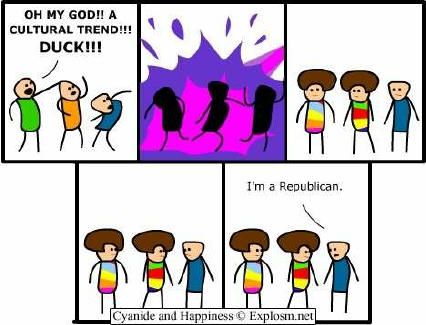
Posted by Dave Baxter at 4:20 PM 0 comments
REVIEW - OLGA One Shot (Caruso Comics Considered, Part 3 of 3)
Olga One Shot (ADVANCE)
Review by Dave Baxter, posted February 18, 2008

Pencils: Simon Fernandes
Inks: Simon Fernandes
Price: $4.00
Publisher: Caruso Comics
An 18-year-old narrator relates his story, of an experience obviously life-affecting: a girl named Olga, a girl he hasn’t spoken to or seen in years, calls him up, out of the blue, and asks to get together. Being a shy and—other than a lackluster part of a local hockey team—introverted sort, the narrator agrees, somewhat excitedly but equally (naturally) confused. Olga soon reveals herself to be a desperate, near-suicidal case, having been recently rejected on the romantic front, and so she looks to this socially awkward boy to save her, somehow, and do so in the course of a single night.
To say that Olga, the comic, is exciting, would be a lie, but to say that it’s slow or boring would be the same. It is, without a doubt, an unhurried story. It takes place within a very constrained about of time (a single night) and so is allowed a heavily detailed, wonderfully molasses-slow movement, but this tends to heighten the suspense rather than obliterate it. What’s going to happen? What’s wrong with this girl Olga? What’s the narrator going to do? What’s going on?!? All these questions seem imperative when turning the pages of this latest one-shot by newcomer Dino Caruso.

The narrator remains unnamed throughout, which was probably a smart move on Dino’s part, as without the name the exact true-to-lifeness of the story remains uncertain. It smacks of autobiography, especially the truly poetic turns of events at the end, moments that seem so un-story-like and yet apt that they could only come from reality. The story is delightfully involved with its own weight, so much so that it also becomes self-conscious of its own weight, and ultimately manages a series of life-lessons that aren’t in the least bit preachy, because the lessons skirt the primary issues involved and instead comment upon core understandings of human thought and behavior that…well…they’re actually quite astute, and acute, and mean more and pertain to the story to a greater and heftier degree than what anything more directly preachy could have managed. Caruso intuitively pulls off a magical hat trick, allegorically speaking, showing readers a straight path only to offer an end moral that’s basically: “Space is curved, kid. There ain’t no straight lines, only relative ones.”
Simon Fernandes joins Caruso for Olga, an artist with a thick-lined, stunted-figure style most commonly seen in webstrips, animation, and underground comix, though he uses the aesthetic to great effect here. Under Fernandes’ depictions, the narrator appears sweetly self-contained in both touching and arrogant ways, as demands the story. Olga and the side-characters are also seen across a wide array of moments, each calling for a showmanship of expression most artists would be hard-pressed to achieve. In a way, Olga is Fernandes’ warm-up, a thing he’s very, very good at but not quite perfect for. Caruso and he have a new book coming soon called The Amazing Adventures of Bell Boy, wherein Fernandes begins to cultivate a style and slickness not seen since Mike Kunkel’s Herobear and the Kid. The previews of Bell Boy look genuinely attractive (check ‘em out and I dare you to disagree!).

So that wraps up “Round One” of Caruso Comics. Three very quality comics, two slice-of-life inspired, one a bit more wild and woolly and pulp-flavored. There’s also a baseball themed graphic novel titled Against the Wall (an early preview of which was reviewed on BF) and that’s technically the last of the “Round One” books, and then comes the very intriguing “Round Two’ers”: the aforesaid Bell Boy, Fisk: Substitute Hero, and Courage, all of them genre-flavored and therefore upping the excitement factor by a thousandfold or so. After Olga and Crossroads, and A Cautionary Tale, and the sincere skill they were all executed with, I honestly can’t wait.
###
For ordering copies of Olga or other Caruso Comics, go to http://www.carusocomics.blogspot.com/ and send Dino a message.
An official website (http://www.carusocomics.com/) is in the works, though it’s only a homepage for the moment (see date of this article above for an exact definition of “the moment”).
Posted by Dave Baxter at 5:46 PM 0 comments
REVIEW - A CAUTIONARY TALE (Caruso Comics Considered, Part 2 of 3)
A Cautionary Tale One Shot (ADVANCE)
Review by Dave Baxter, posted February 17, 2008

Pencils: Paul Quinn
Inks: Paul Quinn
Price: $4.00
Publisher: Caruso Comics
Talk about classic: what comic reader doesn’t have a notebook or scrapbook chock-full of notes and scribblings, ideas and character concepts alongside the odd plot outline, all of which we may or may not have ever had honest intentions of pursuing, but which we love musing upon and keeping records of for posterity’s sake alone if nothing else? Dino Caruso, being a writer, is more involved with such a notebook than most, though he’s definitely preaching to the choir with A Cautionary Tale, and it’s a sermon the faithful ought to revel in.

A down-and-out narrator, drinking himself into a stupor in a local dive establishment, is coaxed into relating his tragic tale to a handsome young couple (who only half actually care, but hey, this disheveled stranger’s kind of aggressive, so let’s just let him talk…). So the story is told, a story about stories, about unrealized stories that are written down, recorded, hoarded, until the world, to the writer, becomes a threatening place. As time passes, the writer grows paranoid, obsessively so, and turns away from those once close to him. To make matters worse, he can’t bring himself to actually show anyone his work for fear of concept-theft. Will he lose everything before he comes to his senses and simply tries to be proactive about his writing career?
Ha! The joy of A Cautionary Tale is that it is indeed a cautionary tale - it simply isn’t that easy. Like the best Twilight Zone or Tales From the Crypt speculative horror short, Caruso’s Tale smacks readers upside the head, posing as a contemporary fable with a tail-end moral only to collapse into a fantastically vicious finale. The characters are stylishly written, the emotion realistically represented, the pacing attractive; it’s a captivating one-shot, made unforgettable by its clever leap away from any overly naïve, morally enlightening end (a thing that would have been easy to flow into). Caruso proved his steady-as-she-goes writerly chops with his Crossroads, but here he has a lot more fun, gets a touch more stylish, and showcases some unique qualities to his conceptual dexterity.
Artist Paul Quinn returns (also of Crossroads fame) and he, too, is allowed a greater level of artistry, moving from noir to slice-of-life to pulp and back again, as the story wills. His use of blacks is hence heavier and more versatile, his range of characters and actions equally so. He makes the book look like an authentic thing, from the very era its cover steals so liberally from (there’s irony for you, stealing from stories for a story about stealing stories), though the final product feels nicely modern nevertheless. Composition is strong throughout, and never once does the art feel less than mainstream professional.
He makes the book look like an authentic thing, from the very era its cover steals so liberally from (there’s irony for you, stealing from stories for a story about stealing stories), though the final product feels nicely modern nevertheless. Composition is strong throughout, and never once does the art feel less than mainstream professional.
A much more ambitious and therefore impressive offering than Crossroads, A Cautionary Tale goes a long way to convincing that Caruso is nothing like a one-trick pony, and that, whatever else he does, it’ll be well worth a gander. His style is classic while managing a certain fresh factor, or at least, it never struck me as stale or rote, and his taste in artists is impeccable. I’ve got one more book of his to peek at for now, Olga, which I’m going to hit up this weekend. After the last two…man…now I’m excited, but also, now I have expectations! Let’s see how he does….
###
For ordering copies of A Cautionary Tale or other Caruso Comics, go to http://www.carusocomics.blogspot.com/ and send Dino a message.
An official website (http://www.carusocomics.com/) is in the works, though it’s only a homepage for the moment (see date of this article above for an exact definition of “the moment”).
Posted by Dave Baxter at 5:40 PM 0 comments
REVIEW - CROSSROADS One Shot (Caruso Comics Considered, Part 1 of 3)
Crossroads One Shot
Review by Dave Baxter, posted February 16, 2008

Pencils: Paul Quinn
Inks: Paul Quinn
Price: $4.00
Publisher: Caruso Comics
No one can accuse independent comic writers of shirking their own life material. There exist an equal (if not greater) number of slice-of-life autobiographical works hot off the small presses than any of the more mainstream-associated genre fare. To say that newcomer Dino Caruso better have something worth talking about, then, to inaugurate his own eponymous brand of sequential storytelling is more than lip service: he better, or it’s gonna be lost and never again found amongst the towering stacks of similar such titles that’d intimidate even a pro publisher’s slush pile, such is the market’s current saturation. So…Crossroads is one of his firsts, a one-shot detailing a particular, pivotal moment in the author’s life, thinly veiled as fiction (or, if this story is fiction, it’s thoroughly masked as not). How does it fare?

Wonderfully well, actually, shockingly, nothing thrilling about the story itself, but the script and approach to rather run-of-the-mill subject matter allow for a sincere and poignant look at a universal experience, a coming of age romantic chord that’s twang should resonate with darn near everybody. The plot follows a college-age narrator as he divulges a “crossroads” moment of his life to an unknown audience. Writer Caruso plays it coy, and smartly so, moving his narrator through several seemingly important events and instances of uncertainty, forever stringing both his fictional audience as well as the reader toward the book’s title instant of true life-altering decision. Being a book about young love (or rather, youth relationships, which, as the book attests, isn’t always about love or anything near so selfless), the story follows a clear and familiar path, though Caruso masterfully walks a fine line between cool reflection and heartfelt sympathy, the emotion of every moment present but not overpoweringly so, never choosing to slum it in sappier regions.
Caruso is joined by artist Paul Quinn, a man with a strong and simple style, appealingly akin to the old newspaper-strip style of Frank Bolle (Apartment 3-G), an aesthetic that more than enhances the classic drama of Crossroads. Quinn maneuvers through an entire 20-page story consisting of little more than talking heads and quiet character interactions  (and between only three characters to boot!), yet manages to keep the reader’s eye and mind from wandering a scant anywhere before the covers are closed.
(and between only three characters to boot!), yet manages to keep the reader’s eye and mind from wandering a scant anywhere before the covers are closed.
Crossroads is a deft example of how an autobiographical tale can be captivating with nary a “clever twist” or “original approach” in sight. It’s a straightforward story smoothly written, exactingly illustrated. It’s satisfying and a solid read. Maybe it won’t stand out amongst the rest of the riff-raff, but it probably should.
###
For ordering copies of Crossroads or other Caruso Comics, go to http://www.carusocomics.blogspot.com/ and send Dino a message.
An official website (http://www.carusocomics.com/) is in the works, though it’s only a homepage for the moment (see date of this article above for an exact definition of “the moment”).
Posted by Dave Baxter at 11:43 AM 0 comments
Tribute to Steve Gerber
As many of you likely WON'T know, one of the best comic writers in history passed away last weekend. Well, I guess it's Monday, so technically the weekend before last weekend. His name was Steve Gerber, and he was one amazing man. He was battling against a degenerative lung disease, pulmonary fibrosis. He was waiting for a lung transplant, a thing that would have extended his life by perhaps five to ten years, tops, but time was against him even then.
A funny anecdote: another writer wrote about Steve: he said that Gerber was a heavy, HEAVY smoker, and smoked to the very day his health issues required him to stop. He had already been diagnosed, and yet still, he didn't drop a single pack. Finally, his lungs just couldn't support it and he had to stop. To the bitter end, Steve swore (and believed!) that his smoking had nothing to do with his lung problems. The writer telling the story mentioned this because, and I quote: "it was the only time I'd ever seen Steve divorced from reality".
And there's truth to that. Steve was a phenomenal, insightful writer, clever, deft, sharp as a tack. Even he, apparently, had a limit and a wall he reached when it came to the vice that likely finished him before he should have been finished, but thank god it was the only such wall he was caged by. On all other fronts, Steve was housed only by comic book stories unlike anything any other writer has ever, seriously, produced.
There's plenty of folks who wrote about him after his passing, but me and a few of my Broken Froniter colleagues gave it a shot as well. Mine's a little ways down, as I've included everyone's. Enjoy, and rest easy Steve. Miss ya already. --Dave B.
Steve Gerber 1947-2008: A Tribute
Lowdown by The BF Staff, posted February 15, 2008
As all will be aware by now, last weekend we lost Steve Gerber. Steve's most famous creation was probably Howard the Duck but his body of work included Man-Thing, Omega the Unknown, The Defenders, Guardians of the Galaxy, Void Indigo, Sensational She-Hulk, Foolkiller, Sludge, Nevada, Hard Time and so, so much more. At the time of his passing he was working on the Dr. Fate feature in DC's Countdown to Mystery. The Broken Frontier team take the opportunity below to give their personal recollections of the impact Steve's writing had on them and extend their condolences to Steve's family and friends.

Tony Ingram writes: I’m not sure when I first came across the work of Steve Gerber, but if the date has been forgotten, the effect of his writing has not. As a kid growing up in the Seventies, I was pretty much a loner. It wasn’t that I disliked people - I just didn’t understand them; their cliquishness, their need to always be in a crowd. My closest "friends" were the comic book characters I read about all the time, but though I liked them, I had little in common with them. Even the misfit X Men were in a group, and had each other. Obviously, there was something wrong with me.
And then, I discovered The Defenders, a "group" of people who really were misfits. I met Nighthawk, always seeking approval, and Jack Norris, always trying to understand a world that made no sense to him. I discovered Omega the Unknown, a superhuman with tremendous potential who just hadn’t a clue who he was or where he was going, and Howard the Duck, who considered the whole world crazy. And above all, in the pages of Man-Thing, I discovered Richard Rory, the ultimate everyman; just wanting everyone to get along and, preferably, leave him in peace to play his music.
And suddenly, it was okay to be a loner. Because there were a lot of us, after all. Thanks, Steve.
Bart Croonenborghs writes: I’m from Belgium. There, I said it. My comics were always way behind your comics. My comics needed to be translated… this takes time. You can stop laughing now. We are allowed to drink beer when we reach the age of 16. Being 8 years old and in possession of a world that has the exact width and breadth as your bicycling range, I did not know about any publication time-lags or shipping delays or other some such nonsense. Comics arrived in shops, one month apart. That was it.

I read The Defenders in Dutch. I knew these were some mad comics. Except for Norm Breyfogle’s Batman, it was one of my favorite books. Comics to me existed in a kind of fugue state not unlike a kids’ perception in the Sixties in the States, before the advent of the Direct Market. You took whatever you could get. I was so obsessed with not missing an issue that I would go to the bookshop the same day every week to check on the comics.
The shop owner once grabbed me by the coat and accused me of stealing. I did not buy something every week, you see. I felt bad afterwards for a long time, even though I did not steal anything or even thought about stealing them. I just did not want to miss an issue.
Steve Gerber? Never heard of him at that age, but I knew The Defenders had a Voice. Stronger than the story. Something was said between the lines in those issues. You could beat me upside the head with a caveman holding his wife and sixteen children and I could still not tell you exactly what. The characters seemed to give voice to a higher power. In the Avengers comics, the Masters of Evil were attacking the New York Manor and boy was that exciting, but the story was the story, the characters played the part they were expected to play. Nothing more, nothing less. But The Defenders and later Howard the Duck… the story had subtext, hidden messages, a Voice.
Being young is being impressionable. These comics impressed me. Nowadays, as a writer, they awe me. This is what Steve Gerber taught me: never give up, find your voice, make your mark. You could sniff a Gerber comic from a mile off. I wish you could smell my comics from a mile off. Or my writing.

Andy Oliver writes: I first came across Steve Gerber’s writing in the 1970s and immediately realized I was reading something very different, something very special. As a kid I just loved the out and out weirdness of Man-Thing, and the uncompromising, biting humor of Howard the Duck. As an (alleged) adult I learnt to appreciate the humanity of Steve’s work on so many other levels; whether they were philosophical, satirical, political, psychological or even downright experimental.
Of all his creations, though, the one I always had the softest spot for was Howard the Duck. While the Marvel super-hero set may have had their soap opera-style problems there was still a large element of wish-fulfillment embodied in their fantasy world that meant I could empathize with them, but never really identify with them. Howard was different though. As gloriously absurd as his adventures were, I could connect with Howard in a far more personal way because, to use the famous tagline, who amongst us hasn’t felt "trapped in a world he never made"? Who doesn’t want to rail against the world of the "hairless apes" on a daily basis for its thoughtless stupidity, overindulgence and unfairness? Steve had far more to say about the realities and frailties of the human condition through that little anthropomorphic duck than every "hard luck Peter Parker" and allegorical mutant story combined.
The Internet can be a scary place, full of rampant excess and tiresome hyperbole. But in Steve Gerber’s case, not one word of the online praise and appreciation that has deluged cyberspace in the wake of his passing, is unjustified or exaggerated. He was, quite simply, that unique a voice and that irreplaceable a talent.
First beer tonight is raised to you Steve. Cheers!
Dave Baxter writes: Steve would have winced to hear it, but I discovered him through the movie version of Howard the Duck. As a child, I thought it was a wonderful film, a completely wild and astonishing urban adventure starring, of all things, a duck.
Thankfully, I graduated to a box of actual Howard the Duck comics via an aunt who held hostage the entire run of Gerber’s original Volume 1 down in her basement. To say I was enchanted by the comic, to say I was educated by it, would be an understatement of epic proportions. It was phenomenal, insightful, entirely unpredictable though never purely non-sequiter. It was what we in the biz like to call "smart", "intelligent" even. And that was the core of Steve Gerber as a writer: imagination unfettered, with no horizon to his own shrewd acumen.
 Whether he focused upon the politics of politics, environment, culture, sociology, or just plumb commentary on day-to-day human idiocy, Gerber approached it all with a charm and swagger that was irresistible. He cared. He wanted to change things, affect things, but he wanted people to listen, and that meant developing a voice few writers and hardly a comic scripter around has ever achieved: total self-awareness and the ability to write about topics that mattered, in ways that people were willing to read. Gerber found a voice that was sympathetic, for all its criticisms, a voice that loved as much as it loathed, a voice that couldn’t help but give a person pause for its honesty and sincerity.
Whether he focused upon the politics of politics, environment, culture, sociology, or just plumb commentary on day-to-day human idiocy, Gerber approached it all with a charm and swagger that was irresistible. He cared. He wanted to change things, affect things, but he wanted people to listen, and that meant developing a voice few writers and hardly a comic scripter around has ever achieved: total self-awareness and the ability to write about topics that mattered, in ways that people were willing to read. Gerber found a voice that was sympathetic, for all its criticisms, a voice that loved as much as it loathed, a voice that couldn’t help but give a person pause for its honesty and sincerity.
I didn’t know Gerber as a "name" until his Vertigo series Nevada struck shelves in the mid-90s, a sort-of spin-off from Howard the Duck that, while never finding a large audience, I know was received as one step beyond joy by those who read it. We all hoped, to this very day, for a sequel — such was its power. In the midst of a revolution in comics heralding the violent and unapologetic storytelling of Ennis and Ellis and Morrison, Gerber sallied forth with a hysterical, over-the-top, and ultimately humane series that adapted to the times and, indeed, surpassed it. He made it look effortless.
If I have any regret, in living in a world that housed Steve along with myself, it’s that I didn’t reach out and say word one to him until Countdown to Mystery #1 was released, only a scant few months ago. I discovered his blog, read wonderful postings as sharp and yet cautious as his writing ever proved, and even managed to post a few comments and receive a response or two in return from him - absolute highlights in my career as a reviewer, I can tell you that much.
I learned there about his struggle for survival. As usual, the world hardly batted an eye. His blog filled with a few stalwarts that cared, and even a few that merely wanted to take up space inside of his blogosphere for whatever they felt they needed it for, to deride him, to promote the odd whatever. And through it all, as he bore the weight on his own mortality (let that sink in)… he continued to respond, kindly, thoughtfully, and pen one of the best comics to come out of DC in years.
As usual.
He was a modern master to the end, a humanitarian with more insight and understanding on any given day than the rest of us might manage, collectively, throughout the course of our inwardly-seeking lives. He was one hell of a writer. Crème de la crème. He has not left without touching thousands, deeply, truly, ineradicably. I’ll miss his presence dearly, but, more importantly, I’ll forever be happy that he was here period. That was Steve’s effect on people he never knew, and who never really knew him. I can only imagine the effect he had on those who did. He was and is of the very best to have come and gone. Godspeed, m’man.
Sam Moyerman writes: One of the oddest things about going to college is finding out you can study all sorts of topics you never thought possible. So when I saw a course at Penn State that covered comics, I jumped all over it. Sadly though, as a child of the late 80s and early 90s, until I got to college it seemed like all I knew of comics was X-Men, Marvel, and Image. And it wasn't until this class (Integrated Arts 10 for any Nittany Lions reading this) that I learned of some of the greats that I never even noticed before. People like Alan Moore, Neil Gaiman, even (as ashamed as I am to admit this now) Will Eisner.
 But the one guy who seemed to stick out of all of them was Steve Gerber. Here was a man who was not only famous for creating one of Marvel's funniest characters, but also for fighting for the creative rights of him. What made him stand out even more is that my only knowledge of said character was a crappy 1980s movie that made Roger Corman's Fantastic Four film seem like an Oscar winning effort. I, of course, am referring to Howard the Duck. But for some reason, I was learning (in college no less) about this creator's ongoing struggles for control of his irreverent mallard.
But the one guy who seemed to stick out of all of them was Steve Gerber. Here was a man who was not only famous for creating one of Marvel's funniest characters, but also for fighting for the creative rights of him. What made him stand out even more is that my only knowledge of said character was a crappy 1980s movie that made Roger Corman's Fantastic Four film seem like an Oscar winning effort. I, of course, am referring to Howard the Duck. But for some reason, I was learning (in college no less) about this creator's ongoing struggles for control of his irreverent mallard.
Fast forward a couple of years. I'm now out of college and my tastes in comics have changed dramatically to those I was taught about and suddenly Marvel Comics is announcing their new Max line of Mature comics, which will be headlined by one Howard the Duck miniseries, written by none other than Steve Gerber. Now, I'll be honest, initially I bought the book more out of curiosity than anything else. Quality-wise I had no idea what to expect. Comics from Gerber's time had tended not to age well to modern audiences and there was a little apprehension on my part. But boy did it ever come through.
Somehow Steve Gerber made his way back to his most famous creation and made me enjoy a book more than I ever thought possible. Satirically brilliant, Gerber hit all topics. The book was topical and written for modern audiences. He took chances and attacked everyone. And yet somehow, as he was throwing caution to the wind, leaving no stone unturned, and treating nothing sacred, he made a poignant statement, made the reader think, and also treated everything importantly. The series made me laugh so much I had to reread every issue over and over again. It was such a good series I even forgave him for turning Howard into a rat for most of it. Thank you Mr. Gerber. The comics world is not the same without you.
Posted by Dave Baxter at 2:11 PM 0 comments
Labels: Comics
An Absolute Atheist Reviews Christian Comics (it's still coming)
Yes! I have not abandoned this idea! I've just been (as all the reviews below may attest) SWAMPED with my regular work, so this side-project is still waiting impatiently in the lobby.
But it's coming! Swear!
Here's a sneak peek at the first issue I'll be dissecting: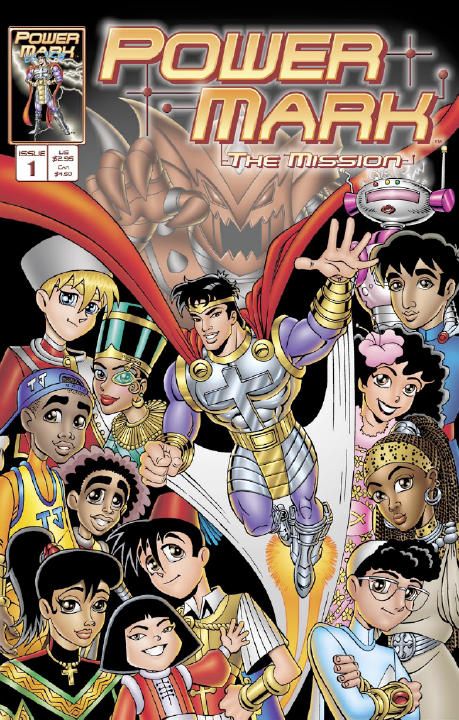
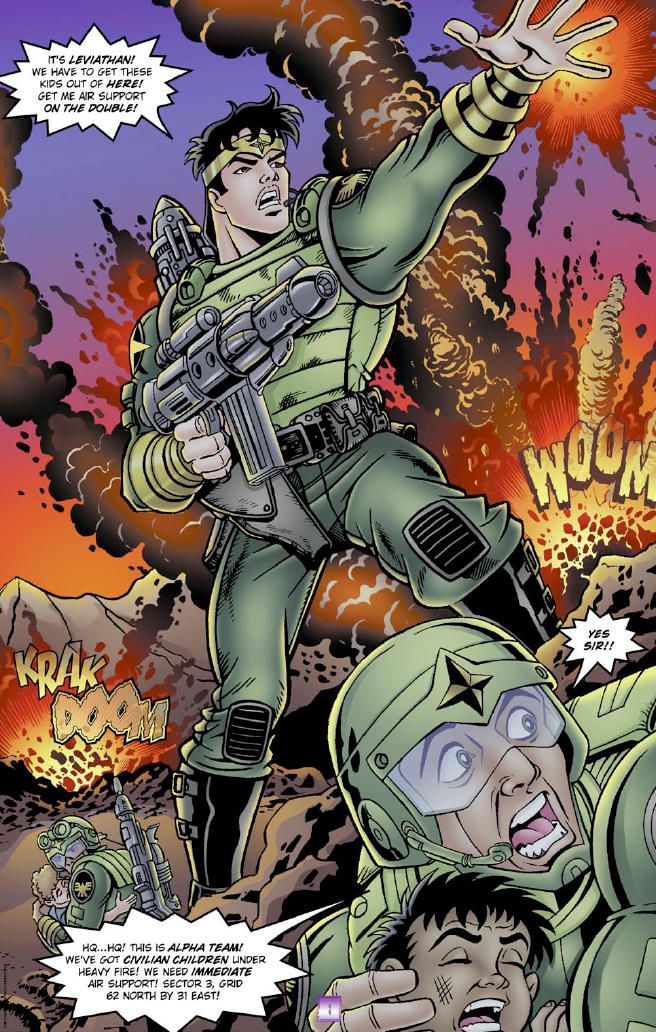
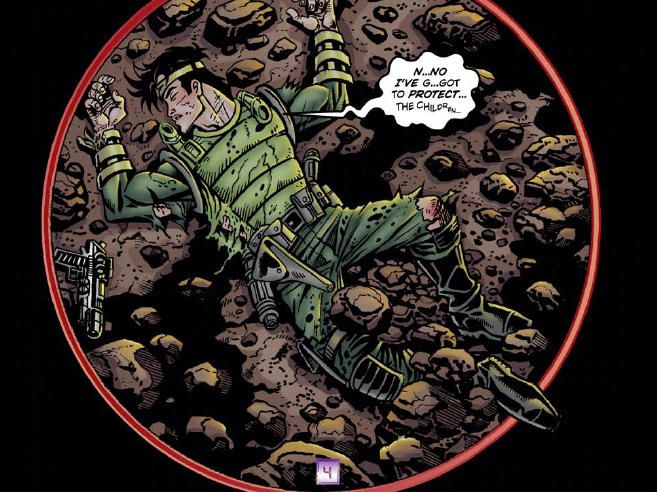
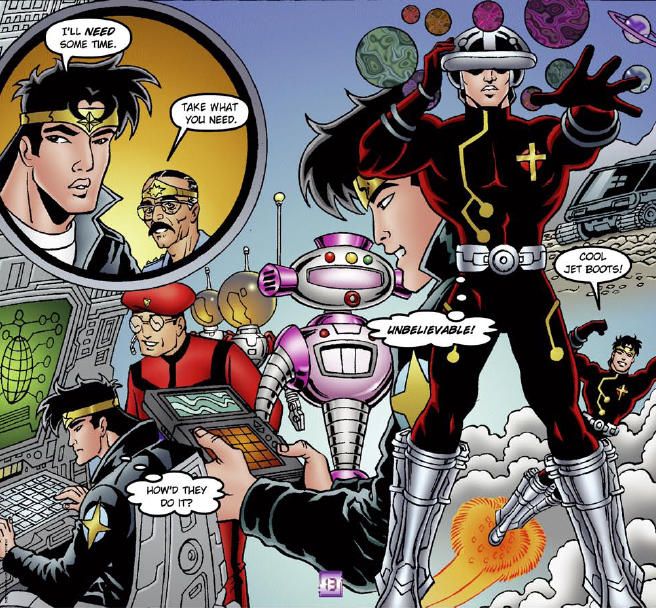
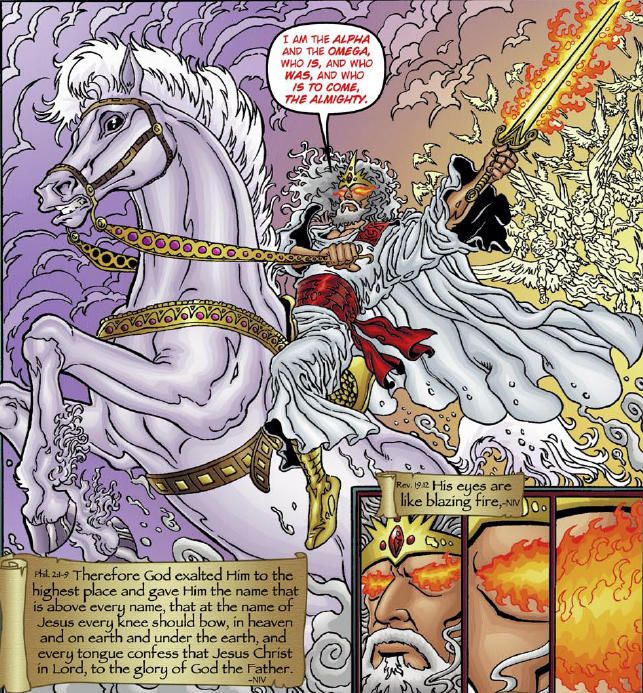
It's a 48 page, double-sized first issue...with a LOT of scripture attached to it. This is not necessarily fun...and it's taking longer than I thought...but I'm still committed! (and when it comes to the big "C", you kind of have to be, in all meanings of the word....)
Posted by Dave Baxter at 10:02 PM 0 comments
REVIEW - SKY PIRATES #1 (of 5) from Free Lunch Comics
Sky Pirates #1 (ADVANCE)
Review by Dave Baxter, posted February 12, 2008

Pencils: Brian Brinlee
Inks: Michael W. Kellar
Cover Colorist/Interior Tones: Jet Amago
Price: $3.95
Publisher: Free Lunch Comics
When it was little more than an arrangement of character sketches, bios, and an eight-page sequential story short, Sky Pirates wasn’t, ultimately, strong enough to walk away with the grand prize in Dimestore Productions’ 2007 Small Press Idol competition. But the concept was arguably the most enticing of the entries: pirates that sailed upon flying ships inside a futuristic though classic high fantasy setting. For all the judges’ critiques as well as suggestions given by fans, one thing was unanimous: everyone wanted to see more of the property. Win or lose, everyone wanted the real thing, the full-on full monty comic.
So a half-year later, here we are: Sky Pirates, a five-issue mini published through Free Lunch Comics with the promise of more, should the book prove popular. Thankfully, creator Everett Soares and artist Brian Brinlee have two things going for them from the start: 1) the book already has a vocal and passionate fan base culled from the contest (no soul could resist a bear wielding a giant hammer!), and, 2) the first issue of this new mini far exceeds expectations.

The scripting of the 8-pager that ran during the SPI contest was only quality in part, on the whole striving to accomplish far too much without proper character build-up. But the deft handling of the characters, situations, and action inside Sky Pirates #1 is superior on all fronts. First off, Soares has crafted a fantasy world that could easily translate into a novel or series of such, so intricate and thorough is his world-building here. He hasn’t merely filled in the gaps to a standard fantasy mold via Mad Lib structure—(character name) of the (race) hated by the (race) who worship the (god) seek the (item) to fulfill the (prophecy) although (twist of story)—but instead he’s crafted a fully functioning world, with a history and numerous nations, races, politics, religions, etc., that simply continue to function. Everything isn’t tossed into a single plot, nor does everything hinge upon a single action. The world continues as any world would, because Soares has designed a believable, workable universe in full, the heroes and villains of the story, then, the focus but not the locus; they move to the setting, and not vice versa.
Beyond this unexpectedly subtle and developed sense of design, Soares also surprises by moving with a casual, steady flow narratively. No longer rushed to cram high-drama moments back to back inside a scant handful of pages, Sky Pirates #1 manages to carefully plot moments of character kitsch, naturally occurring action sequences, hints of history both personal and otherwise, and weave them together into a rare-to-find, assured action debut. As much as I enjoyed Soares’ concept during the contest, I wasn’t expecting anything so refined as the tale woven in Sky Pirates #1. For those who caught the story entered into the competition, or managed to snag a copy of Issue #0 (a collection of all the bits and pieces thereof), I’m happy to report: all the relationships and high points seen previously are continued herein, and then handled with a far greater skill and panache than previously experienced.
Brought kicking and screaming out of Soares’ head and into the real world, then, is art by Brian Brinlee, now joined by inker Michael W. Kellar with lush grey tones by Jet  Amago, and with these three together, the crew of the Rogues Revenge look better than ever. Brinlee is allowed a wider breadth and range to his design and composition, due to the higher page count and a wider variety of scenes. Better yet, he’s lost none of the previously showcased clever action choreography and character expression of Issue #0. Kellar proves a consistent and strong inker while Amago’s tones offer a truly enhanced final package.
Amago, and with these three together, the crew of the Rogues Revenge look better than ever. Brinlee is allowed a wider breadth and range to his design and composition, due to the higher page count and a wider variety of scenes. Better yet, he’s lost none of the previously showcased clever action choreography and character expression of Issue #0. Kellar proves a consistent and strong inker while Amago’s tones offer a truly enhanced final package.
A shockingly well-written book, with greater depth to the characters and environment than its preview portended, better looking, too, with smooth, skilled artwork—Sky Pirates #1 from FLC is a marathon of leaps and a bounds beyond its predecessor, #0. For anyone who thought the original package held potential, or for anyone who plumb thinks pirates and flying ships are always worth a gander, this new series looks to barrel over expectations and satisfy, through and through.
###
Check out the video trailer for a cool compilation of nearly everything found inside the rare Issue #0.
Posted by Dave Baxter at 9:45 PM 0 comments







